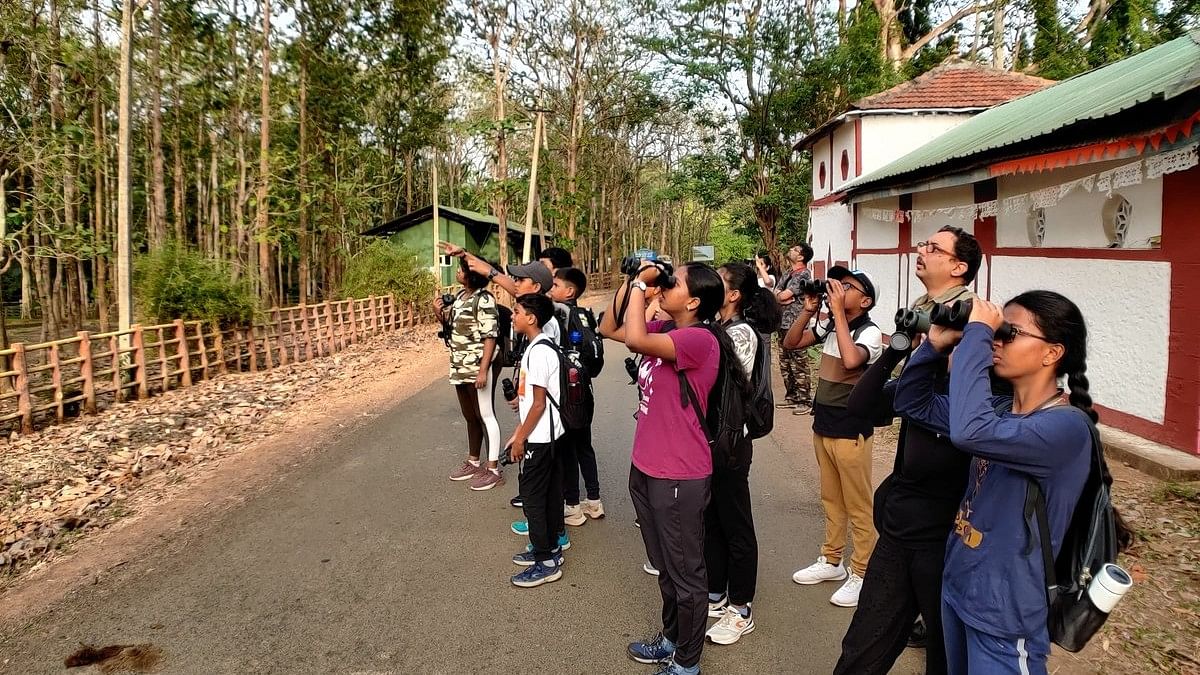
The only birds that Suveer Chalageri, a 13-year-old student from Bengaluru, could identify before this summer were crows, pigeons and those hovering above the concrete jungle of Bengaluru. But today, after a four-day stint as a ‘kid forester’ at Kali Tiger Reserve, he is not only able to identify forest birds by their calls, but can also understand the behaviour, habitat and life cycle of the birds.
“I was not a birder before. But today, with the help of a few mobile apps, I can identify birds by their calls. I have started enjoying nature and am mesmerised by the diversity of the avian world,” says Suveer.
He is not alone in feeling so. In the last two years, over 144 children who attended the summer camps near Dandeli have developed a sense of connection with nature and a better understanding of the reasons why it should be protected.
‘Kid Foresters’ is a programme organised by the Karnataka forest department under its nature education programme, since the summer of 2023. In 2023, the officials had organised five such camps. This year, two camps have been conducted thus far.
This is a first-of-its-kind nature camp in India for students in the age group of 10 to 16 years. The aim was simple: To introduce them to the world of mesmerising animal kingdoms, right from a young age.
The officials of Kali Tiger Reserve used the vast expanse of the evergreen forest as classrooms for participants to teach practical lessons. Yakshagana and puppetry were also used to teach creatively about the conservation of nature.
Vasanth Reddy, Chief Conservator of Forests, Sirsi Circle, says the concept of Kid Foresters was envisioned last year to bring kids closer to nature. “We intend to provide general information about wildlife, survival skills and the importance of conservation of nature through these camps.”
The kids also learned about the roles of different forest personnel, from forest guards to watchers and deputy range forest officers. They visited hamlets and villages in and around the tiger reserve to understand the life of forest dwelling communities. The children also visited anti-poaching camps to get a peep into the lives of some of the guardians of the jungle.
Last year, the organisers focused on wildlife. This year, they decided to concentrate on birds, considering the diverse avian population in and around Dandeli.
The department has designed the camp in such a way that it would make students more curious about the subject. For instance, the students were given a research question on birds that could help them understand how researchers and scientists work.
At the end of four days, the students were able to identify 35 species of birds including hornbills, sunbirds, parakeets, trogons, drongos, paradise flycatchers, doves and woodpeckers among others.
Adhya C S, a 10-year-old student from Hyderabad, says the camp at Kulagi nature camp gave a glimpse into something beyond what she had learned in her classroom. “We were taught about the importance of protecting forests and how the green cover helps us to live on this earth. We should not pollute this earth,” Adhya says, on one of her key learnings.
Several students said that such camps are very important, as there is hardly any real-life experience for the average budding wildlife enthusiast.
Rudra Kale, a 13-year-old student from Mumbai, wants to be a wildlife scientist. “My parents and I have been looking for such camps across India, but could not find one. In this camp, I was introduced to the bird species of the Western Ghats. I learnt so many fascinating things about birds, mammals, insects, reptiles and trees,” he says.
The parents of the kids who attended these camps say they are seeing a sea of changes, not just in their kid’s perspective towards nature, but in other aspects too. “Ever since my daughter attended the camp, she has become more independent,” says Deepa Chollan, an IAS officer whose 13-year-old daughter Sanvi attended one of the camps this summer.
For Sanvi, the camp has opened new means of expression too. “We presented a skit on conservation and learnt about birds that were not in any of our textbooks,” she says.
Reddy says they are working on improving the camps by roping in more experts, diversifying the species included and are also planning to conduct mid-term camps.